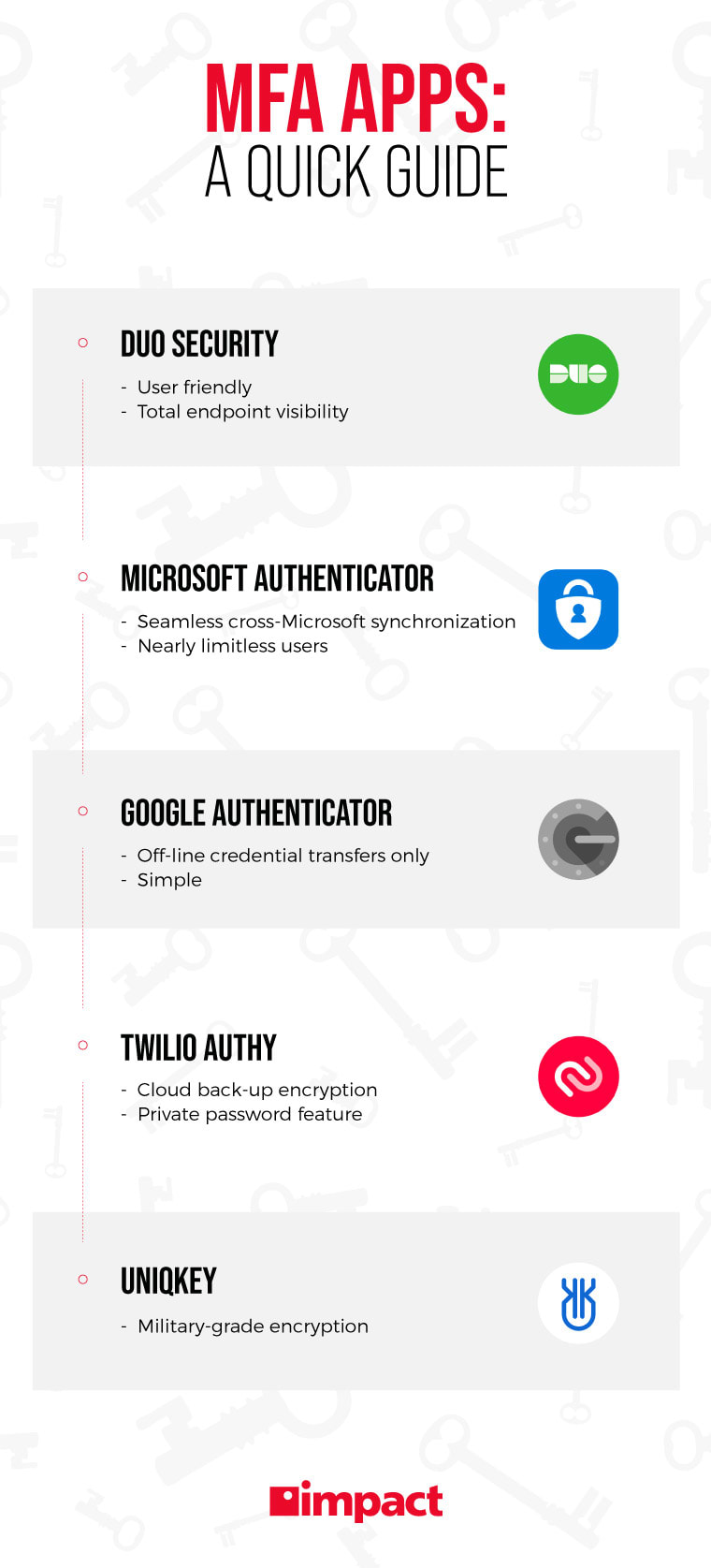Multi-factor-authentication (MFA) is quickly becoming a standard best practice for organizations of all sizes. This security practice emerges as a necessity while cyberattacks become more and more frequent each year. Understanding the importance of setting up MFA protocols in your organization is one thing, but deciding which MFA app is the best choice for your business, that’s a whole other puzzle.
If you’re new to the concept of multi-factor authentication, this quick clip will walk you through everything you need to know before we break down the best MFA applications available today.
Stay up to date with the latest trends in organizational security by listening to this webinar featuring the experts at Impacts they break down The Difference Between IT and Cybersecurity Standards.
1. Duo Security
First up is Duo Security, made by Cisco, a security and networking company.
A couple of the of the notable and appealing aspects of Duo Security is that it offers a free entry level price and is extremely user-friendly. While it doesn’t offer all the bells and whistles that come with other MFA applications on this list, its simple framework and ease of use makes it popular among companies and employees alike.
Duo Security is consistently updated to be optimized for the latest smartphones and processors, and it grants total visibility over endpoints. Additionally, Duo Security can be backed up to Google Drive or the iCloud letting users transfer credentials to new devices hassle-free if necessary.
2. Microsoft Authenticator
Microsoft Authenticator is a major player in the MFA application space. This comes as no surprise with their dominant market share in other tech sectors as well. The Microsoft Authenticator MFA application is available to both Android and iOS users and allows for widespread adoption.
Being able to add both as many users as you’d like without limit and as many protected accounts as you need makes the Microsoft Authenticator application one of the best on the market for large-scale organizations.
Because it’s a Microsoft product, there are also built-in compatibilities and sync features with other Microsoft accounts which can enhance the user experience.
From a design perspective, the MFA application from Microsoft sticks to a fairly minimalistic look and feel with ease-of-use top of mind.
3. Google Authenticator
In direct contrast to the Microsoft Authenticator application, the Google Authenticator is designed without any additional internal compatibility with other Google applications.
Rather, Google took a zero-frills approach to the MFA application in general, and has done little to update it since its initial launch. This may sound like a drawback, but it’s actually one of the reasons so many people like the Google MFA application.
Since there’s no cloud backup feature, the only way to transfer credentials from one device to another is offline, which offers an additional layer of security. The one major drawback here is that the user experience suffers some. However, that hasn’t stopped the MFA application from securing a 45% small business market share and a 36% mid-market share.
4. Twilio Authy
From physics we know that every reaction has an equal and opposite reaction. This couldn’t be more true when it comes to Twilio’s Authy MFA application which has a significant upside and a matching significant downside.
The upside is that Authy offers encrypted cloud backup. This is a huge advantage in the security space, and is only strengthened by the fact that you can enter a private password in order to encrypt the login information for your linked accounts. Since the password is private, Authy has no record of it, can’t be forced to open your accounts (even for the authorities) and if you forget it, it’s lost forever.
On the flipside of this is the fact that users can add accounts to new devices with PIN sent via SMS or call. This poses a security vulnerability especially in the form of SIM-card-swap susceptibility.
A final note to make about Twilio is that there is an Apple Watch app for interested consumers.
5. Uniqkey
Uniqkey is an appropriate choice of title for this MFA application as it’s a little unique itself. As a Danish cybersecurity brand that provides enterprise security solutions, Uniqkey’s largest differentiator is that it employs military-grade security to encrypt and store data locally.
On top of this, Uniqkey provides a seamless user experience across mobile and smart devices, and prioritizes matching maximum security with cost efficiency for the user’s benefit. The theory at Uniqkey is that cyber resilience should be easy to create.
